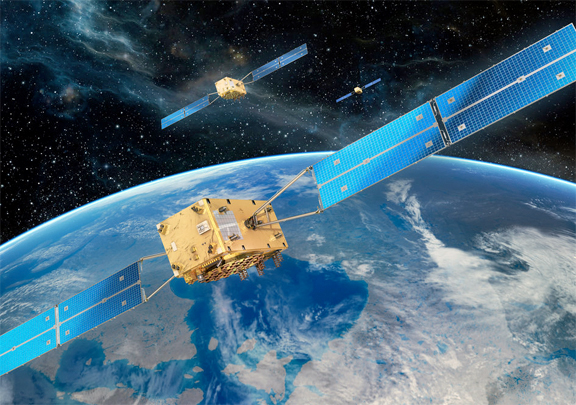[Satnews] Having completed their intensive checks in space, two more of Europe’s Galileo satellites are now fully operational.

Adam and Anastasia, the Galileo FOC (Full Operational Capability) Satellites 3 and 4 assembled by OHB System AG (a subsidiary of OHB SE, ISIN DE0005936124) are broadcasting navigation signals and, since the December 1, have been relaying search and rescue messages from across the globe. Galileo FOCs 3 and 4 were launched from Europe’s Spaceport in French Guiana on 27 March 2015. Once the satellites were nursed to life in orbit, their navigation payloads underwent a lengthy test campaign. This involved assessing whether the satellites themselves were performing as planned and meshing with the worldwide Galileo ground network. The satellites’ secondary search and rescue payloads were also put to the test, picking up and relaying UHF signals from distress beacons as part of the international Cospas–Sarsat System. The first pair of full satellites was placed in incorrect orbits in 2014 by a malfunction of their Soyuz launcher’s upper stage, but the elongated orbits have since been modified so that the navigation payloads can perform as planned. The European Commission is set to make a decision on whether they will be employed as part of the Galileo constellation.
The second pair, launched in March 2015, was inserted into the correct orbits. In September 2015 the third pair was also set in the correct orbits and is undergoing payload testing. This pair should enter service early next year.
The latest Galileo FOC twins assembled by OHB, named Antonianna and Andriana, have already arrived in French Guiana, aiming for a Soyuz launch on December. The intention is to have those satellites (Galileo FOC 7 and 8) ready to enter the operational constellation by next spring.
“These latest two operational Galileos are the third and the fourth Full Operational Capability satellites,” said David Sanchez-Cabezudo, ESA’s Galileo In-Orbit Test Manager and he added, “these are the versions that will make up the bulk of the Galileo constellation in space, with 16 satellites still to be launched. The checks carried out from the Galileo Control Centres in Oberpfaffenhofen in Germany and Fucino in Italy, as well as from Redu, prove the performance of these two satellites is excellent for navigation purposes.”


